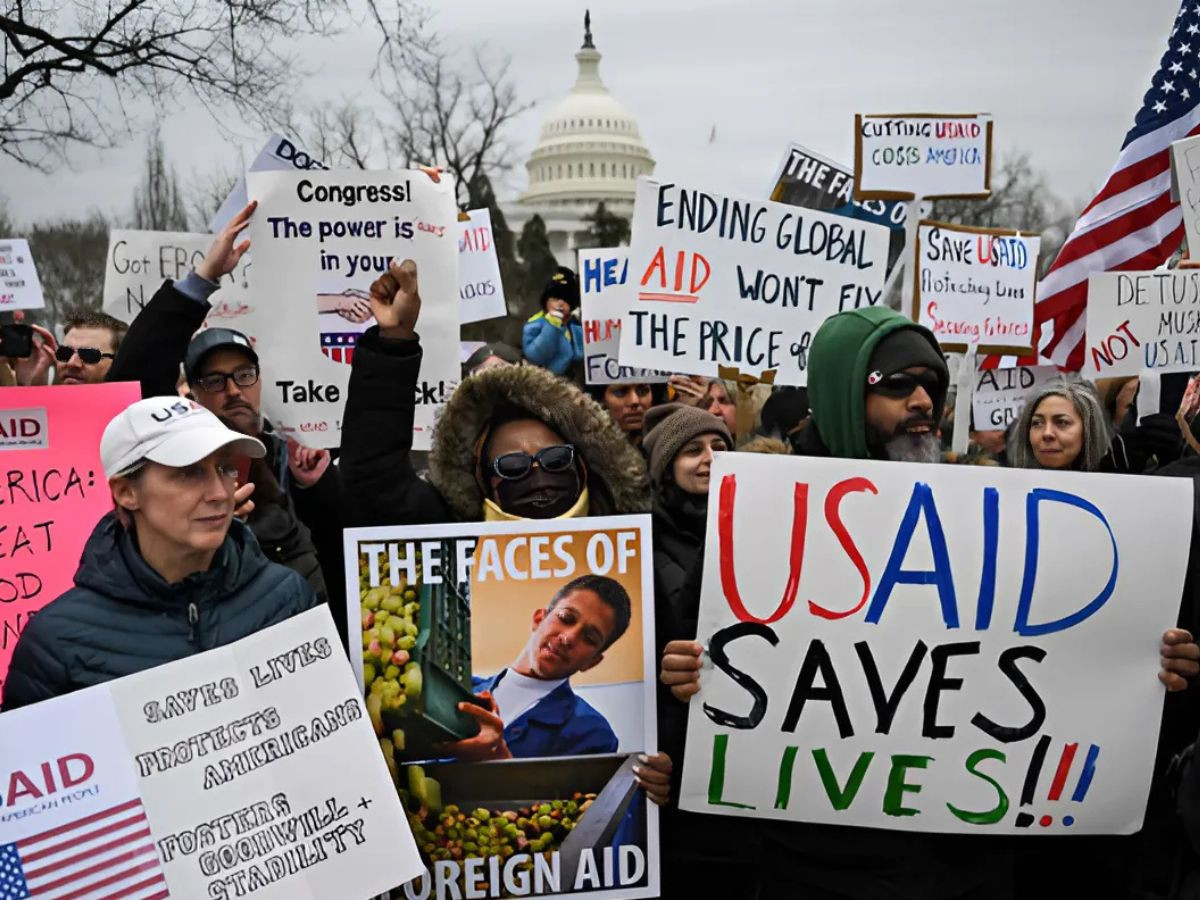
USAID frozen — because nothing says ‘Great Again’ like global suffering
Donald Trump, a representative of the destruction and violence of our time, imposed a 90-day freeze on all humanitarian funding globally on his first day in office—January 20th, casting a bleak and morbid shadow over the desecration that is imminent over the next four years.
As the world is left reeling, Pakistan is also left the worse for wear. Historically, the country has been a major recipient of United States Agency for International Development (USAID) funding, receiving $116.5 million in 2024 alone.
Now, with a sudden halt in all USAID-backed programs, the impact on Pakistani organizations and the communities they serve is already devastating.
One such casualty is the Legal Aid Society (LAS), a non-profit organization that has been working for the last seven years to provide marginalized communities with access to justice.
With projects focused on domestic violence, women’s rights, and legal empowerment, LAS heavily relied on USAID funding. Now, 150 out of 220 employees have been indefinitely suspended, their futures uncertain.
An LAS employee, who wished to remain anonymous, shared their experience:
“My project at the Legal Aid Society came under the United States Institute of Peace (USIP), where we created safe spaces, Markaz-e-Falah-o-Bahbood-e-Niswan (Centre for Empowerment and Welfare of Women) for women facing domestic violence in Matiari, Larkana, and Dadu—cities in Sindh with the highest number of unreported domestic violence cases.
These safe spaces provided free legal aid for women facing domestic violence, allowing them to report incidents, seek legal advice, and access financial literacy classes and psychological support. We also held awareness sessions to educate people about domestic violence—its types and the importance of speaking out.”
They stress upon the importance of the work their project was doing for local society, and the precise moment where everything had come to an abrupt halt:
“Outside of our project, 8-9 other projects were running at the Legal Aid Society, and 4-5 of them have been completely shut down following the USAID freeze. From February 2nd to 7th, my project included a training session for criminal justice sector actors, such as police officers, investigation officers, medico-legal officers, and prosecutors—all of whom handle domestic violence cases.
Unfortunately, in Pakistan, these actors aren't trained to deal with gender-based violence cases sensitively. Our project had planned to train these individuals in gender sensitization, awareness of laws related to gender-based violence, and appropriate victim interview techniques.
On Friday, January 24th, we had finalized all plans for the upcoming week, setting up the training sessions. But by Sunday, January 26th, we received a message saying that USAID funds were frozen, and we were instructed to stop our work.
Initially, I thought this decision would be temporary, only affecting our project, as it was directly associated with USIP. However, on Monday, January 27th, we learned that all USAID funds had been frozen, including those from other donors like the Bureau of Democracy, Human Rights and Labor (DRL) and UN Women, impacting multiple projects, including one related to women's property rights and dispute resolutions.
Our CEO informed us that, due to the freeze on USAID funding, 150 out of 220 employees would be laid off.
This news was shocking and heartbreaking.
Other important projects, such as those focused on property rights, sexual violence, and minority rights, were also shut down. We were told January 31st would be our last day, and we had to hand everything over and leave.”
This isn’t just about lost jobs—it’s about the lives affected by these projects, from survivors of abuse who now have nowhere to turn, to legal officers who will remain untrained in handling gender-based violence cases.
“With just two months left to complete our project, all our plans have been ruined. While we are jobless and financially affected, it’s the beneficiaries in the field who are suffering the most. It’s hard to explain the situation to them.
Our field officers are also now jobless, and in a city like Dadu, where the development sector has been impacted, finding new jobs seems impossible.
This situation has hit us hard. We had created safe spaces for women, but now no one is left to run them. We’ve been temporarily suspended from LSA, and the US government has requested a 90-day review with no guarantee of a resolution.
It’s an uncertain situation, and we can’t risk our careers on it. As soon as we find new jobs, we will resign.
We were all asked to write a one-page document explaining how our project aligns with Trump’s idea. I know it sounds ridiculous, but that’s what we were instructed to do, so we did it.
Now, we’re all at home looking for other jobs. I’m young and don’t have the responsibility of a family, but many of my colleagues do.
One of our coworkers, an uncle who worked in the admin and procurement department, had just celebrated the birth of his daughter by distributing mithai, and now he’s jobless. It’s heartbreaking.
This situation is affecting not just us, but also our drivers and support staff, who don’t have the same opportunities elsewhere. Everything has fallen apart.
We keep sharing job offers with each other, but the whole situation is incredibly disturbing, shocking, and heartbreaking.”
The funding freeze doesn’t stop at legal aid. IREX, a key organization managing exchange programs like Global UGRAD, Fulbright, and the Pak-US Alumni Association, has also suspended its operations in Pakistan.
For countless students and professionals, these programs have been life-changing, offering opportunities that would otherwise be out of reach.
For better or for worse, studying in the US is a massive goal for many. For those who have benefited, or were looking to benefit from these exchanges, this suspension feels like more than just a bureaucratic decision—it’s the loss of a bridge that connected dreams to reality.
If legal aid and education weren’t enough, the US has also pulled the plug on the Climate Smart Agriculture (CSA) investment program, a $24 million initiative designed to help Pakistani farmers adapt to climate change.
Launched in November 2024 by US Ambassador Donald Blome, the program aimed to help Pakistani farmers adapt to climate change through advanced, sustainable farming techniques.
Now, as US officials prepare to leave and national staff face unemployment, Pakistan’s already fragile agricultural sector suffers another major blow, with many futures left up in the air.
The initiative, once positioned as a beacon of hope for struggling farmers, has been abandoned before it could make a meaningful impact.
If all of these consequences seem drastic and far-fetched to you, you are not alone. Once we start unraveling the thread of the US influence on our lives, we will find just how deeply woven it is within the fabric of our society.
This begs the question: Is USAID so easily dissolvable, and can Trump revoke US funding on his own?
The short answer is no, he cannot. He does not have the power to unilaterally dissolve USAID without Congress support.
Although, there is nothing stopping him from keeping everyone in executive order limbo until he’s worn everyone down: the people, the media, and maybe even Congress.
There is some precedent for this. During Trump’s first term, he tried cutting foreign aid by a third, but Congress blocked it. His administration then used funding freezes and other tactics to stall approved funds, leading to a legal battle.
The Government Accountability Office later ruled this violated the Impoundment Control Act, which bars the executive from withholding congressionally approved funds.
Personally, I don’t think Trump and his administration - the band of bullies - are aware of the extent to which this monumental decision affects their own reputation.
The United States has wreaked havoc in one way or the other in so many countries of the world, interfered in wars and political affairs where no one had asked for their help, decimated lands, left the local people to fend for themselves, maintaining its geopolitical dominance not just through military interventions but through soft power—education, development, and aid—their one-stop solution to keep up a facade of benevolence.
By abruptly halting these programs, the US isn’t just pulling support from Pakistan; it is creating a power vacuum that another global player—China, Russia, or even regional powers—could easily step in to fill.
If history has shown us anything, it’s that the absence of influence doesn’t create neutrality; it creates new allegiances and new empires.
In the short term, the damage has already been done. Local projects are shut down, jobs are lost, and communities that relied on these initiatives have been abandoned.
The world is watching, and the question remains—how far will Trump go before he realizes the cost of his own recklessness?




COMMENTS
Comments are moderated and generally will be posted if they are on-topic and not abusive.
For more information, please see our Comments FAQ